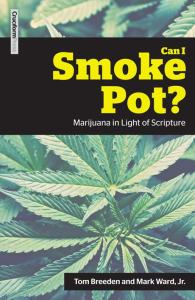 I’m a big fan of the books Cruciform Press are publishing. They are short and simple as well as usually geared towards relevant issues of our time. Recently I picked up a copy of one of their latest books called Can I Smoke Pot? by Tom Breeden and Mark Ward.
I’m a big fan of the books Cruciform Press are publishing. They are short and simple as well as usually geared towards relevant issues of our time. Recently I picked up a copy of one of their latest books called Can I Smoke Pot? by Tom Breeden and Mark Ward.
The tagline of this book (“Marijuana in Light of Scriptures”) says it all. In this book, Breeden and Ward use Scripture to discuss the questions many Christians are asking today: Can I smoke pot? Can I use marijuana for medical purposes? The Bible permits drinking alcohol but not drunkness so can I smoke pot as long as I don’t get high? All these questions and more are discussed in this helpful book.
Breeden and Ward start their discussion where the Bible starts – creation. They show the reader that like everything God created, marijuana was created good. However, sin entered into the world and marred God’s good creation. The idea of calling marijuana “good” may be difficult for some Christians but Breeden and Ward rightly add that “respectable, buttoned-down, middle-class, church-attending Western Christians need to say full-throatedly that marijuana is good – or they’ll be betraying Genesis 1 and 2” (page 17). If you stop reading the book at this point you may think the authors are supporting any and all uses of marijuana. This is not the case. If one continues reading they will see that.
Next Breeden and Ward discuss marijuana and government. Scripture clearly teaches that Christians are to submit to government as long as government is not out right rebelling against God’s Word. In this section the authors build a Biblical argument for government being part of God’s good creation and how Christians are to act towards government. So before one can consider if marijuana is right or wrong for medical or recreational use, they must first submit to the laws their government has put in place. For us the US, we are in a strange spot. Some states have legalized the use of marijuana but at a federal level the use of marijuana is still illegal (page 31). With this being the case, Breeden and Ward correctly state that “as of this writing, for any Christian, anywhere in the United States, to smoke pot is to resist the governing authorities. It is, in unmistakable terms, to resist God” (page 32).
What about using marijuana for medical purposes? This is where the discussion goes next. Unlike the other chapters, the authors are less strong in stating their stance here. I believe they do this wisely because there is much we still don’t know about the issue of medical marijuana. But what they do argue in this chapter is that if marijuana can be used for medical purposes, the fact that it is commonly used for evil shouldn’t keep us from using it in medically. Again, this may be a hint as to the authors convictions on this issue but they never state it much more than that in this chapter. They also use this chapter to show the reader that medicine is a gift and tool that God often uses to heal. Christians shouldn’t reject the use of medicine but should accept it as a gift and tool that God uses.
Breeden and Ward finish up their discussion with tackling the biggest question that comes up with this issue – since the Bible allows Christians to drink but not get drunk, can’t Christians smoke pot and just not get high? Before answering that question the authors spend the first part of the chapter dealing with what the Bible says about drinking alcohol. They do an excellent job of using Scripture to argue that drinking alcohol isn’t a sin but getting drunk clearly is a sin. It’s important to note that the authors themselves stand on different sides of the drinking issue but agree with the statement above. One author drinks in moderation while the other chooses not to drink at all (page 56). After this, the authors move to showing the reader how marijuana is actually very different from alcohol. One cannot use the Biblical argument for alcohol for marijuana. One can drink without getting drunk. However, very little marijuana gets you high. One can drink without the goal of getting drunk but it seems that getting high is really the only goal in doing marijuana. Breeden and Ward correctly state what I believe is the Biblical stance against recreational use of marijuana: “It is sinful to get high for the same reasons it is to get drunk. Being high lowers inhibitions, clouds decision making, and deprives people of fruitfulness in their work. Alcohol and marijuana share this danger. So we can conclude that the Bible forbids getting high just as it condemns drunkenness. Smoking marijuana recreationally in order to get high is sinful” (page 72).
This book is extremely Biblical based and gives solid content in regards to marijuana use. As marijuana use becomes even more popular (and probably more legal in the future) Christians need to know how to address it with a clear understanding of what Scripture says. I would recommend this book to all Christians, but especially those in pastoral ministry (this book will be a great resource as you teach and disciple your people).